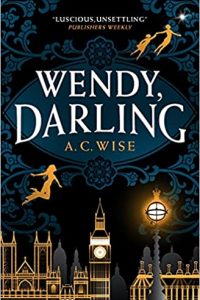Ian Mond Reviews Frankissstein by Jeanette Winterson
 Frankissstein: A Love Story, Jeanette Winterson (Jonathan Cape 978-1787331402, £16.99, 352pp, hc) May 2019. (Grove Press 978-0-8021-2-9499, $27.00, 352pp, hc) October 2019.
Frankissstein: A Love Story, Jeanette Winterson (Jonathan Cape 978-1787331402, £16.99, 352pp, hc) May 2019. (Grove Press 978-0-8021-2-9499, $27.00, 352pp, hc) October 2019.
We’re all familiar with the story. In 1816, on a miserable summer’s day in Lake Geneva, Lord Byron challenges Doctor John Polidori, Percy Shelley, and Percy’s soon to be wife Mary Godwin, to invent their own tales of the supernatural. This, the most famous rainy-day activity in the history of Western literature, produces Polidori’s Vampyre (the first modern rendition of the vampire legend) and Mary Shelley’s Frankenstein; or, The Modern Prometheus, arguably the first-ever science fiction novel. In her boisterous new book, Frankissstein: A Love Story, Jeanette Winterson toggles between the 19th century – those fecund days cooped up in Bryon’s rented mansion on Lake Geneva – and a post-Brexit Britain of sex-bots, cryogenics, and the search for immortality.
Appropriately, the scenes set in a rain-soaked Switzerland are viewed through the eyes of Mary Shelley. She is an intelligent woman surrounded by smug, patronising men, debating the nature of the soul, including the belief – supported unsurprisingly by Polidori and Byron – that the life-spark – “not the soil, not the bedding, not the container” but the animating principle – is male. As depicted by Winterson, these late-night discussions, coupled with Mary’s proto-feminism (heavily influenced by her late mother, Mary Wollstonecraft) and her tragic intimacy with death – Mary has already lost a child – become the inspiration for Frankenstein.
Winterson treats Mary’s creative genius and the difficulties she faced throughout life with a great deal of admiration and compassion. But it’s the ideas that have rippled forth from Frankenstein since its publication in 1818, ideas that have influenced science fiction writers for more than a century, that capture Winterson’s imagination. She takes us to the 21st century and, in a move that should be distracting but rather harmonises with the themes of the novel, introduces us to contemporary analogues of those who were present at Lake Geneva in 1816. Our point of view character is Mary’s counterpart, a transgender doctor and journalist named Ry Shelley who has a keen interest in “human relationships, mental health and the effect of bots on both of those things.” Ry is having an affair with Professor Victor Stein, a charismatic, enigmatic, and world-renowned expert in artificial intelligence who has an ambitious plan to push humanity toward the singularity: a scheme that involves cryogenically frozen heads. His project is funded by Ron Lord, a Welsh entrepreneur and purveyor of high-end sex dolls (or, as he likes to call them, XX-BOTS). We also meet Polly D, a journalist for Vanity Fair who has strong misgivings about Professor Stein’s work; and Claire (the doppelgänger for Claire Clairmont, Mary’s sister-in-law and the mother of Byron’s daughter Allegra), an evangelical Christian, who recognises the religious potential in Ron Lord’s sexbots.
Frankissstein is an enormously funny novel, something that’s exceedingly rare these days. The bulk of the laughs come from the misogynist and politically incorrect mouth of Ron Lord, whether he’s explaining the five models that make up his sex-doll range or comparing Claire – whom he has fallen in love with – to the first sexbot he owned, also named Claire (“it’s like you have come back to me in human form”). The most outrageous set-piece is when one of Ron Lord’s dolls – folded up in an Adidas gym bag – is accidentally activated at a speaking event, screaming all manner of smut at a shocked audience (“DON’T MAKE ME WAIT, DADDY!”). Ron is undoubtedly a figure of fun (who Winterson clearly gets a kick out of writing), but it’s impossible to ignore his treatment of women and his refusal to recognise Ry as a man because he doesn’t have the correct genitalia. Ron’s reactionary attitude sums up the central theme of Frankissstein: that technology has never been particularly successful at making us better people. Just as Mary Shelley critiques man’s hubris when it comes to advances in science, Winterson argues that our growing dependence on algorithms and heuristic technology to make our lives easier has done little to encourage the better angels of our nature. If anything, they feed into and amplify our fear and hatred of the other. As Ry points out to Victor, whether we download our personalities into the cloud, or map consciousness on an artificial interface, “all our faults, vanities idiocies, prejudices [and] cruelty” will remain.
Just like Victor’s creation, Frankissstein: A Love Story is a patchwork of voice and style – part historical fiction, part sexy romp, and part dissertation on artificial intelligence, the singularity, and gender fluidity. This hopscotching between ideas and the stark shift in tone – including an extraordinary bit of magical realism where Mary may… or may not meet Victor Frankenstein in an asylum – may irritate some. For me, though, it’s evidence of a novel that, 200 (and one) years after its publication, continues to excite and inspire the imagination of writers; and, in the case of Jeanette Winterson, provides her with a platform to view our current moment through Mary Shelley’s eyes.
Ian Mond loves to talk about books. For eight years he co-hosted a book podcast, The Writer and the Critic, with Kirstyn McDermott. Recently he has revived his blog, The Hysterical Hamster, and is again posting mostly vulgar reviews on an eclectic range of literary and genre novels. You can also follow Ian on Twitter (@Mondyboy) or contact him at mondyboy74@gmail.com.
This review and more like it in the October 2019 issue of Locus.
 While you are here, please take a moment to support Locus with a one-time or recurring donation. We rely on reader donations to keep the magazine and site going, and would like to keep the site paywall free, but WE NEED YOUR FINANCIAL SUPPORT to continue quality coverage of the science fiction and fantasy field.
While you are here, please take a moment to support Locus with a one-time or recurring donation. We rely on reader donations to keep the magazine and site going, and would like to keep the site paywall free, but WE NEED YOUR FINANCIAL SUPPORT to continue quality coverage of the science fiction and fantasy field.







